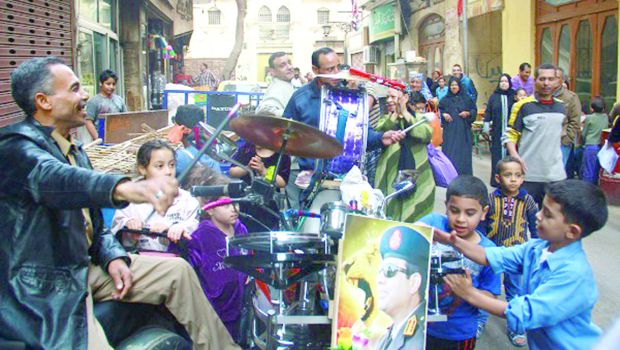
Residents of Cairo’s El-Gamaleya district celebrate Sisi’s presidential candidacy. (Asharq Al-Awsat)
Cairo, Asharq Al-Awsat—“He is our president . . . We are working all day to encourage everyone to vote for him. Field Marshal Abdel-Fattah El-Sisi is one of us,” says 30-year-old Egyptian Amr Hassanain, a resident of Cairo’s El-Gamaleya district, which also happens to be Sisi’s birthplace.
Hassanain, who has installed a large speaker system outside of his shop, told Asharq Al-Awsat: “We broadcast nationalist songs all day to encourage passersby to participate in the elections, and we distribute posters of Sisi and hang banners on walls.”
El-Gamaleya residents have always been proud of the former army chief, but this state of pride has reached frenetic levels as the presidential elections draw closer, and as it becomes increasingly likely that Sisi will be Egypt’s next president. If he does make the move to Egypt’s presidential palace, Sisi will be the first Egyptian head of state—discounting interim president Adly Mansour—to be born and raised in the capital, Cairo. Gamal Abdel Nasser was born in Alexandria, Egypt’s second city, while both Anwar Sadat and Hosni Mubarak were born in the Nile Delta governorate of Monufia. Cairo’s residents have been waiting for a long time for a president of their own.
Said Tawfiq, who works in a shop which sells perfumes and rosaries, says: “Sisi is strongly present in all of El-Gamaleya’s alleyways, despite the fact that he left the historic neighborhood a long time ago. Despite this, posters of him dressed in both civilian garb and military uniforms fill our streets.”
Near Imam Hussein Square, Mohamed Muhiy stands in front of his shop, which sells religious books, swaying to the sound of nationalistic songs praising the military in general and Sisi in particular. He tells Asharq Al-Awsat: “We love Sisi . . . He protected Egypt and the Egyptian people.”
The former army chief and putative president is not the only famous son of Cairo’s El-Gamaleya quarter. Renowned Egyptian novelist and Nobel Laureate Naguib Mahfouz also grew up along the district’s narrow cobblestone streets. He wrote about the special place that this district had in his heart. “El-Gamaleya has held me captive for a long part of my life, even when I managed to remove its chains from around my neck. It was not easy; you leave it only to return, as if there are invisible strings pulling you back to it. And when you return you lose yourself, because this neighborhood is Egypt itself.”
However, one poster of the former army chief appears to dominate all others in Cairo’s El-Gamaleya, and that is a poster of Sisi adorning the entire front of a well-known hotel on Al-Azhar Street. Asharq Al-Awsat spoke with Ahmed Farooq, a 50-year-old hotel owner. “Any stranger who passes through Al-Azhar Street viscerally feels that we are living in election times, with loud music, dancing and unending banners.”
“We aim, first and foremost, to support Sisi and we are urging everyone to participate in the elections,” he added.
In one of El-Gamaleya’s narrow alleyways Mahmoud El-Tabba’a sits at a popular coffee house next to a placard that reads: “The Sisi campaign center.”
“I still recall how we used to play football in the street as children. Sisi used to look out from the balcony but he never played with us. He was concentrating on his studies instead,” Tabba’a said.
Once a popular tourist attraction and a living example of Old Cairo, the districts of El-Gamaleya, Al-Azhar and El-Hussein have suffered a large decline in tourism due to the violence that has engulfed the country since the January 25 revolution. Cafe and souvenir shop owners believe that President Sisi would be able to restore stability and security, which in turn would restore the vital tourist trade.
“Once security is maintained, things will go back to normal,” Tabba’a told Asharq Al-Awsat.
Dating back to the time of Sultan Barquq, the first ruler of the Burji Dynasty in the 14th century, El-Gamaleya has always been a characteristically Egyptian neighborhood. Residents today view Sisi as being a typically “Egyptian” leader, along the lines of the late President Gamal Abdel Nasser.
Another El-Gamaleya resident, Mohammed Helmy, tells Asharq Al-Awsat: “What we have been experiencing over the past month is similar to Eid. It is a festival atmosphere. It is as if the entire city is celebrating Sisi, day and night.”
If Abdel-Fattah El-Sisi does become Egypt’s next president, Cairenes, and particularly the residents of El-Gamaleya, will make sure that those festivities continue.
